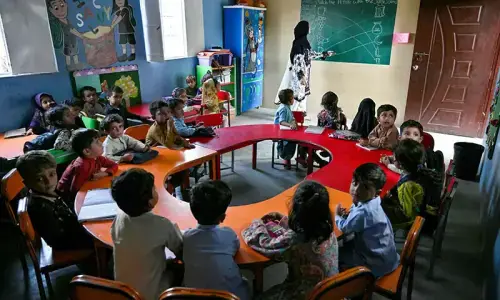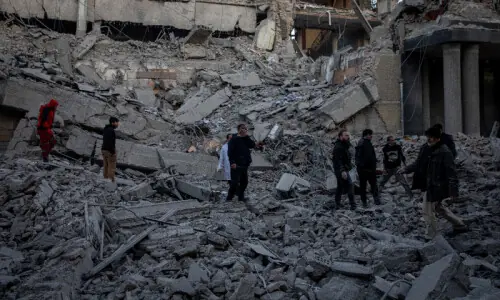ISLAMABAD: Human Rights Commission of Pakistan (HRCP) has demanded the government formulate a comprehensive policy to mitigate the troubles faced by citizens due to displacements.
“Pakistan has seen displacements since its inception and the matter continues to become worse as the time passes but there is still no displacement policy,” said I.A. Rehman, the HRCP secretary general, here on Thursday.
He was speaking at the HRCP consultation to suggest a proper framework on internal displacements.
Mr Rehman said displacements were caused by multiple factors, including the recent operations in Fata, floods, earthquakes and even mega projects that uprooted mostly the weak and vulnerable communities.
“We do not take into consideration the displacements caused by mega projects in the main cities and such a trend is growing in Islamabad where the authorities are taking action against residents of katchi abadis,” he said. “But then where should they go?”
Mr Rehman said the serious issue was that the authorities were taking the displacements lightly and the seriousness that was visible a decade ago was no longer seen.
Dr Khadim Hussain of Bacha Khan Education Foundation said improper policies and the adamant attitude of bureaucracy were encouraging extremists and proscribed groups to penetrate the displaced people for recruitments.
“There are three challenges. We have seen two kinds of people with guns in conflict areas — one in uniform and the other without uniform. The ordinary people fear both and the third challenge for the IDPs is ‘helplessness.”
Dr Hussain said, “We can only imagine the situation only if we try to visualise it: if an announcement is made by the forces to vacate an area in 12 hours or if the attackers declare a war in an area.”
He added: “What will the ordinary people, including families, women, expecting mothers, children and the elderly, do? Just after 5-10 kilometres, they will need water and where do we see the authorities at this stage.”
He portrayed a gloomy picture of conditions faced by the IDPs of Fata and said there had been numerous cases of abuse and exploitation by vested interests during the displacement journey.
“But such stories are discouraged as it bring a bad name to everybody, mainly the authorities. The authorities want to keep away the community-based organisations and political parties from the relief support in the name of ‘chaddar’, pride and safety of the displaced persons, but all that is nonsense.”
Dr Hussain said the conditions at the initial camps of displaced persons had been pathetic like standing in long queues, totally depending on officials for everything, and it shatters their collective ego.
“Under these conditions, people start to lose hope in the system and this allows the extremists and banned groups to enhance their recruitment drive among these vulnerable groups,” he added.
“The best solution is that the army and the provincial government should take political parties and the community-based organisations into confidence to help streamline the system for the IDPs.”
Saifullah Mehsud of Fata Research Centre presented figures to highlight the magnum of the IDP crisis in the country and said out of total 638,144 displaced families, 187,244 were still IDPs.
Students belonging to Fata and experts on psychological impact of conflicts and displaced persons also spoke and demanded the government formulate policies to ensure that the minimum basic human needs, including food, shelter, medical support, safety and education, were provided to the IDPs.
Published in Dawn, November 27th, 2015






























